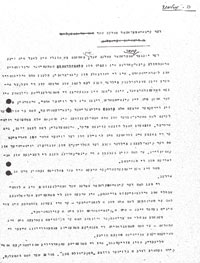Boris (Borukh) Sher was born in 1914 in Siberia. In 1936 he began working as a cameraman for "film-chronicles" for the Moscow studio of documentary films. He shot films about Soviet industrial enterprises and about farm workers. On the day after war broke out between the Soviet Union and Nazi Germany on June 22, 1941, Boris Sher was sent to the front as a military cameraman by the Political Administration of the Red Army.
In August and September 1941 he filmed Soviet defensive battles near the town of Staraia Russa and, as an navigator-gunner and, simultaneously, at the same time, a cameraman, together with long-distance aviators, he flew on missions to bomb German airports. From December 1941 to March 1942 he took part in partisan raids on the German rear, including the destruction of a police unit and attacks on Germans vehicles. He filmed soldiers and officers of the Red Army and also the results of German atrocities against civilians.
On June 10, 1943, during an attack on an enemy airport in the Briansk area, cameraman Sher participated in aerial combat. Since he was taking the place of a gunner, he had to shoot at the attacking plane. He succeeded in shooting down a German Focke-Wulf. On June 26, in a Yiddish radio broadcast to the Jews of Great Britain, writer Hersh Orland described that fight as follows:
"… On its way back, the Soviet squadron of fighter-planes was attacked by a group of Focke-Wulfs. Borukh Sher noticed that one of our planes was being attacked by two enemy fighters. Aiming his machine-gun, the brave cameraman began to fire at the German airplanes. Suddenly fire appeared from one of the motors of the enemy machines. The fascist plane shuddered and, in flames, began to fall." (GARF 8114-1-905, copy YVA JM/26302).
For his role in such risky operations Sher was awarded the Order of the Red Banner in 1942 and the Order of the Patriot War, 2nd class in 1943. In the award certificates Sher was identified as a Russian.
Materials filmed by Boris Sher were used in a number of Soviet propaganda films, the best known of which was the long documentary film "Dear of the Germans near Moscow." The film was first screened on February 23, 1942 and it received a Stalin Prize.
For showing in the United States the film was substantially rewritten and reedited and its title was changed to "Moscow Strikes Back." In 1942 the latter film received a prize from the National Council of Film Critics of America for the best war documentary and, in 1943, won the first Oscar for the Soviet Union, in the category of documentary films. In this version the civilian victims are shown in a universal Soviet context without any indication of their Jewish origin. In other words, there was no reference to the Holocaust. Footage taken by Sher when he visited partisan units appeared in the film "Avengers from the People," which was shown in 1943. In the course of the war, episodes that were filmed by Boris Sher appeared in more than ten films, including ones about the fighting of the Red Army near Minsk, in Lithuania, and in eastern Prussia, and about the American bombers that landed at Soviet airports after carrying out their combat missions.
After the war Boris Sher worked as a cameraman at the Leningrad Documentary Film Studio.
He died in Leningrad in 1994.







